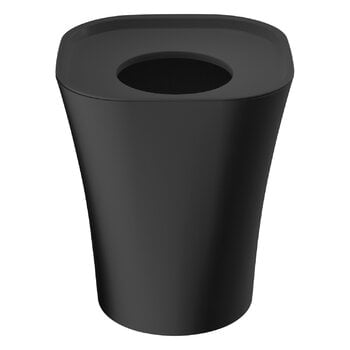Magis Trash is a streamlined paper bin, designed by Jasper Morrison. It features a lid with a hole in it and a holder that keeps the bin-liner on its place, concealed inside the paper bin. The bin's height is 36 cm and top width 30,5 cm. Due to its minimalist design Trash is the perfect choice for any space and office.
Trash paper bin, large, black
Magis
Description
Magis Trash is a streamlined paper bin, designed by Jasper Morrison. It features a lid with a hole in it and a holder that keeps the bin-liner on its place, concealed inside the paper bin. The bin's height is 36 cm and top width 30,5 cm. Due to its minimalist design Trash is the perfect choice for any space and office.
Product details (6)
- Material
- Standard injection-moulded polypropylene
- Colour
- Black
- Width
- 30.5 cm
- Depth
- 30.5 cm
- Height
- 36 cm
- Measurement details
- Diameter: Base 22 cm
- Product ID
Designer
Jasper Morrison (b. 1959) is one of the most successful industrial designers of his generation. He is known for an aesthetic and quietly humorous style that often aims at understated everyday functionality. A graduate from the Kingston Polytechnic and Royal College of Art, Morrison opened his own studio in London in 1986, and today he has offices also in Paris and Tokyo. He has designed products from tableware to tram systems and collaborated with brands such as Alessi, Vitra, Nikari, Flos, Fredericia and Iittala. Morrison’s work has been exhibited around the world, and in 2001 he was awarded the Royal Designer for Industry distinction by the British Royal Society of Arts.
Would you like to read more about Jasper Morrison and his work? Discover our books:
Jasper Morrison: A Book of Things, Super Normal: Sensations of the Ordinary
Reviews (1)
5
Based on 1 reviews
-
A
Anne P
Käytännöllinen ja hyvännäköinen. Käytössä kolme pientä valkoista.
445 days ago
Sustainability
The Product Sustainability Framework, our criteria of sustainable design, helps you find the most sustainable products in our selection. Read below which sustainability criteria this product has met.
Working conditions & labour 9/9
-
Equal opportunities for all employees
-
Commitment to UN Global Compact, fair compensation for all employees
-
Corporate responsibility requirements defined and communicated for suppliers
-
Systematic work for improved inclusion and well-being in the workplace
-
Transparent supply chain
-
Suppliers' compliance to a code of conduct ensured
-
Direct suppliers audited and certified
-
Compliance to the UN Guiding Principles on Business and Human Rights ensured in the supply chain
-
Support for community involvement in the supply chain
Eco-friendly production 7/9
-
Fair and resource-wise water-use in production
-
No incineration or landfilling of returned items
-
No use of endangered species as materials
-
No direct environmental emissions or waste (excl. GHGs) from production
-
Material-efficient and ecological packaging
-
Positive impact on nature’s well-being through operations that regenerate natural ecosystems
-
No potentially harmful chemicals used in own production
-
The sustainability of direct suppliers' production is addressed and monitored
-
Production and material sourcing that respect biodiversity, animal rights, and natural ecosystems
Climate impact 5/8
-
Company's direct greenhouse gas emissions identified and commitment to reduction
-
Product's carbon impact identified and commitment to reduction
-
Guidance on energy- and eco-efficient use of the product
-
Contribution to climate initiatives beyond the brand’s direct operations
-
100 % renewable energy in own production and operations
-
Low-carbon or compensated transportation
-
Carbon footprint of the product calculated and goals set to reduce it
-
Carbon neutral or carbon negative product
Sustainable materials 6/6
-
Sustainable and long-lasting material choices
-
No harmful or hazardous substances
-
Responsible raw material sourcing and production
-
Materials suited for circularity: monomaterials, recyclable finishings, renewable or recycled contents etc.
-
Ecological materials: natural, biodegradable, recyclable or recycled contents
-
Outstanding materials in terms of innovativeness, responsibility, sustainability and circularity: local production or sourcing, 100 % recycled content, C2C-certification etc.
Circular design 4/5
-
High aesthetic quality promoting long-term use of the product
-
Technically durable product design and material choices
-
Design for enduring life-long quality
-
Design and support for product maintenance, repair and upgradability
-
Innovative circular design solutions: circular service system, resale platform, remanufacturing, collection of used products, etc.








